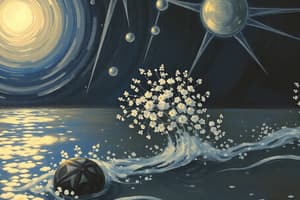Podcast
Questions and Answers
What is the primary aim of science?
What is the primary aim of science?
- To create new technologies
- To uncover natural laws and principles (correct)
- To validate personal beliefs
- To collect historical data
Which step of the scientific method comes after formulating a hypothesis?
Which step of the scientific method comes after formulating a hypothesis?
- Data analysis
- Conclusion
- Experiment (correct)
- Observation
What does a scientific law describe?
What does a scientific law describe?
- A possible explanation of a phenomenon
- Observed patterns or regularities in nature (correct)
- A well-substantiated theory
- The process of scientific inquiry
In which branch of science would you study the interactions between human activities and the environment?
In which branch of science would you study the interactions between human activities and the environment?
How are scientific theories developed?
How are scientific theories developed?
What is one key role of peer-reviewed publications in scientific communication?
What is one key role of peer-reviewed publications in scientific communication?
Which of the following best describes an ethical principle in scientific research?
Which of the following best describes an ethical principle in scientific research?
What characteristic distinguishes science as a dynamic process?
What characteristic distinguishes science as a dynamic process?
What is a responsibility of researchers when conducting studies involving human subjects?
What is a responsibility of researchers when conducting studies involving human subjects?
Why is effective communication essential in the scientific community?
Why is effective communication essential in the scientific community?
Flashcards
Science
Science
A systematic way to understand the universe by using testable explanations and predictions.
Scientific Method
Scientific Method
A step-by-step approach to investigate nature, including observation, hypothesis, experimentation, and analysis.
Scientific Theory
Scientific Theory
A well-supported explanation of a natural phenomenon that's based on evidence.
Natural Sciences
Natural Sciences
Signup and view all the flashcards
Scientific Law
Scientific Law
Signup and view all the flashcards
Scientific Communication
Scientific Communication
Signup and view all the flashcards
Ethical Considerations in Science
Ethical Considerations in Science
Signup and view all the flashcards
Peer-Reviewed Publication
Peer-Reviewed Publication
Signup and view all the flashcards
Nature of Science
Nature of Science
Signup and view all the flashcards
Animal and Human Subjects Research
Animal and Human Subjects Research
Signup and view all the flashcards
Study Notes
Introduction to Science
- Science is a systematic enterprise that builds and organizes knowledge in the form of testable explanations and predictions about the universe.
- It relies on empirical evidence, which is observable and measurable data gathered through observation, experimentation, and other systematic inquiries.
- Scientists use the scientific method, including observation, hypothesis formation, experimentation, data analysis, and theory development, to investigate phenomena and gain understanding.
- Science aims to uncover natural laws and principles that govern the universe.
Branches of Science
- Natural sciences study the physical world and its phenomena.
- Physical sciences, such as physics and chemistry, investigate fundamental forces and matter.
- Biological sciences, such as botany, zoology, and ecology, explore life's diversity and processes.
- Earth sciences, including geology, meteorology, and oceanography, study the Earth's composition, structure, and processes.
- Other branches include astronomy, which studies celestial objects, and environmental science, encompassing the interaction of humans with their environment.
Scientific Method
- The scientific method is a systematic approach to investigating phenomena.
- It involves the following steps:
- Observation: noticing a pattern or problem in the natural world.
- Question: formulating a question about the observed pattern or problem.
- Hypothesis: proposing a possible explanation or prediction.
- Prediction: specifying the expected outcome if the hypothesis is correct.
- Experiment: designing and conducting an experiment to test the prediction.
- Data analysis: collecting and analyzing the data from the experiment.
- Conclusion: determining whether the data supports or refutes the hypothesis.
- Modifications or revisions to the hypothesis are often required which allows for iterative refinement and deeper understanding.
Scientific Theories and Laws
- A scientific theory is a well-substantiated explanation of some aspect of the natural world that's based on a body of facts, laws, inferences, and tested hypotheses.
- Scientific laws describe how nature behaves under specific conditions. They are concise statements about observed patterns or regularities in nature, often expressed mathematically.
- Theories provide explanations, while laws describe patterns.
- Theories are continually refined and updated as new evidence emerges.
Scientific Communication
- Science relies heavily on communication to share findings with other scientists and the public.
- Peer-reviewed publications disseminate research results, allowing for critical evaluation and improvement.
- Conferences play a critical role in bringing scientists together to exchange ideas and advance research.
- Scientists utilize various methods to communicate including journals, presentations, websites, and popular science articles.
- Effective communication is essential to build consensus about scientific findings and contribute to public understanding.
Ethical Considerations in Science
- Scientific research must adhere to ethical principles.
- Researchers must maintain honesty, integrity, and objectivity in their work.
- Animal and human subjects research must follow strict guidelines to protect the well-being of those involved.
- Researchers must ensure that their studies are conducted in a responsible and ethical manner, minimizing potential harm and maximizing benefits.
- Conflicts of interest must be declared and managed appropriately to maintain objectivity.
The Nature of Science
- Science is a dynamic and evolving process.
- New discoveries and technologies lead to constant refinement and enhancement of scientific understanding.
- Science is characterized by skepticism, objectivity, and a willingness to revise ideas based on new evidence.
- Science does not offer absolute certainty, but seeks the most accurate and comprehensive explanations possible.
Studying That Suits You
Use AI to generate personalized quizzes and flashcards to suit your learning preferences.




